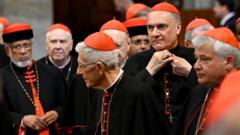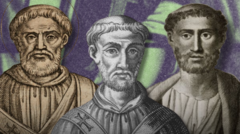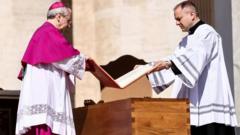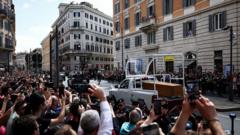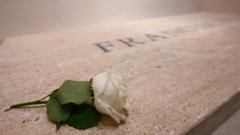As the cardinals gather for discussions, the legacy of Pope Francis hangs heavy, influencing debates on the future of the Catholic Church.
Cardinals Face Divisions as They Prepare to Elect Pope Following Francis’ Death

Cardinals Face Divisions as They Prepare to Elect Pope Following Francis’ Death
The upcoming papal conclave reveals rifts among cardinals amid calls for unity and a potential shift in church direction.
Even before the solemn farewell to Pope Francis at St. Peter's Basilica, the conclave tasked with selecting his successor has been marred by ideological divisions among the cardinals. Conservative factions, who view Francis' tenure as detrimental to traditional church teachings, have launched a campaign with the slogan “unity.” This straightforward rallying cry, however, has been interpreted by supporters of Francis as a euphemism for reverting his progressive approaches that advocated for a more inclusive Catholic Church.
The discussions and politicking among the cardinals signal the contentious issues that await during the papal election scheduled for early May. Central to these debates are whether the new leader would continue to pursue Francis’ initiatives, including the potential ordination of women deacons, the acceptance of married clergy, and the controversial provision of communion to divorced and remarried individuals.
In gatherings held behind the Vatican walls, cardinals are exchanging views, with conservative figures like Cardinal Gerhard Ludwig Müller of Germany championing the cause for unity as a stepping-stone back to older church doctrines. The urgency to reconcile differing ideologies is palpable, as the cardinals face the responsibility of guiding the Catholic Church’s future while reflecting on the complex and multifaceted legacy of Pope Francis.
The discussions and politicking among the cardinals signal the contentious issues that await during the papal election scheduled for early May. Central to these debates are whether the new leader would continue to pursue Francis’ initiatives, including the potential ordination of women deacons, the acceptance of married clergy, and the controversial provision of communion to divorced and remarried individuals.
In gatherings held behind the Vatican walls, cardinals are exchanging views, with conservative figures like Cardinal Gerhard Ludwig Müller of Germany championing the cause for unity as a stepping-stone back to older church doctrines. The urgency to reconcile differing ideologies is palpable, as the cardinals face the responsibility of guiding the Catholic Church’s future while reflecting on the complex and multifaceted legacy of Pope Francis.


